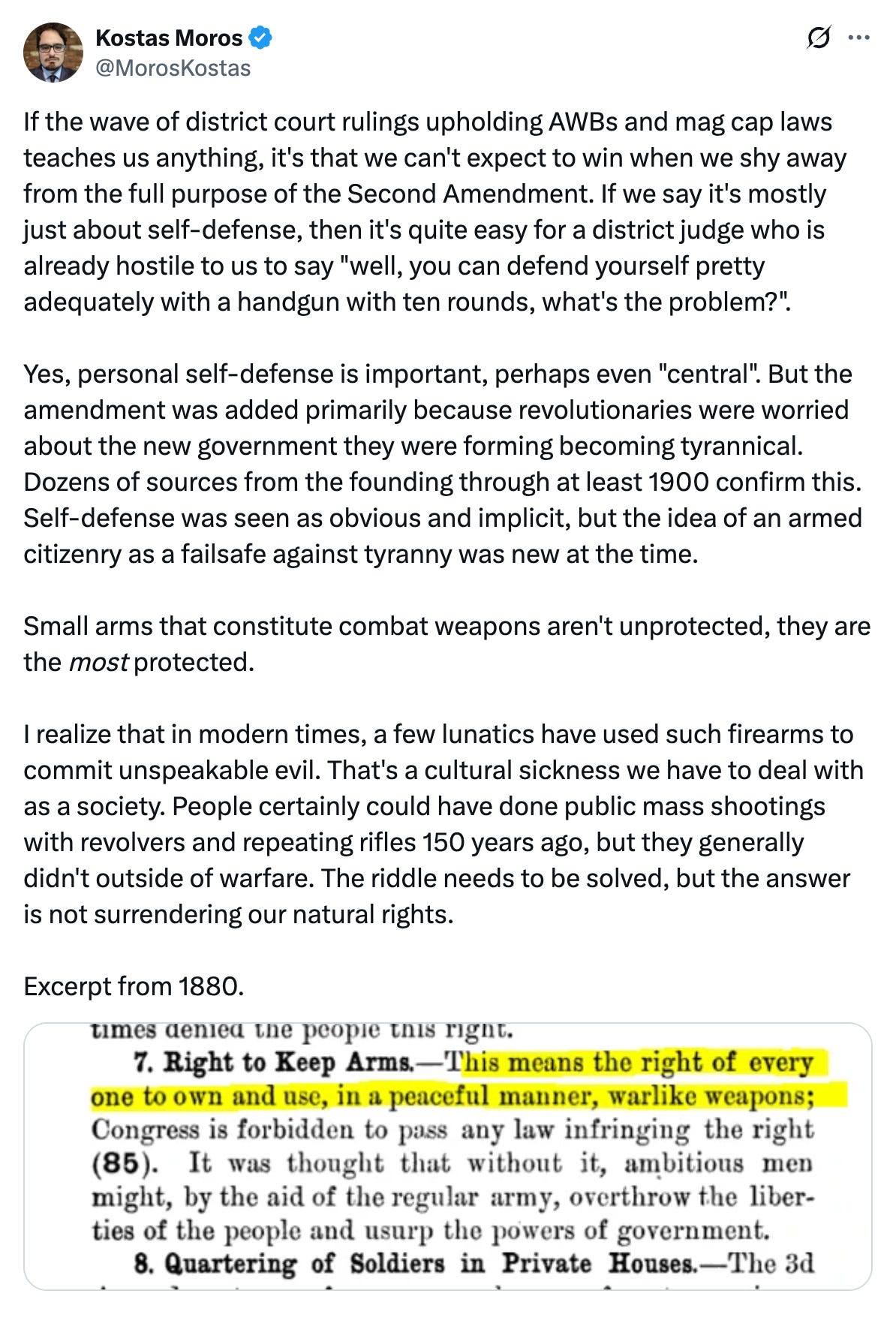OSD 346: How they get you to tighten the tyranny ratchet
“Sure they’re black helicopters, but they’re *our* black helicopters.”
Views of the Second Amendment are converging on something like this:
Not everybody likes that, but even people saying, “Nobody needs an AR-15” implicitly concede the point. They are claiming that nobody needs an AR-15 for personal defense, but their militia-based view of the Second Amendment implies the same conclusion that Kostas reaches above: the intent of the Second Amendment is to provide arms against the government.
So even though they don’t always realize it, everybody agrees that the bedrock purpose of gun rights is that when government agents show up to violate your rights, you can use force to defend yourself against them.
Let’s check in on how that has actually played out through two examples from modern American history.
First example:
Situation: At 1 a.m., federal agents, including an ATF team, raid an apartment building in Chicago. They come in from the ground floor and also rappel onto the roof from a Black Hawk. They go door to door, tossing apartments, detaining everybody, and checking each person individually to decide if they have broken any laws. The people who appear to have broken any law are carted off. Everyone else gets detained for several hours and then gets released if they can prove their innocence to the agents’ satisfaction.
Reaction: this was cheered on by some of the same people who say, “The reason machine guns should be legal is so that I can have an emplacement covering my front door with enfilade fire when the feds show up.”
Second example:
Situation: New York City forms a jump-out squad to drive around poor neighborhoods and frisk anyone they want. The police do this to over 1000 people per day, putting them against a wall, frisking them, and deciding if they’ve broken any laws. In 88% of cases the person is squeaky clean, and in the remaining 12%, the police stumble on something (typically minor) to fine or arrest them for.
Reaction: after leaving office, the mayor who championed this program went back to being CEO of his company which then launched an annual DEI conference series.
Here’s how the tyranny ratchet works:
A movement gets power.
The top priority is to expand power. Not in a structurally-minded, “let’s build a process that naturally works in good weather or bad” kind of way. There’s no time for that, the next election is in T-minus four years. They get what they can take right now. If the consequences are more than a few weeks away, who cares. So they prosecute their agenda like Kobayashi at a Sizzler that’s going out of business.
Predictably, excesses happen in the course of that, and nobody in power tries to moderate them. Quite the opposite. Excesses are a test of commitment to the cause. This is driven by people’s fear of being ostracized from their ingroup. It is human nature that traitors are reviled more than outside attackers are. In Dante’s Inferno, the innermost ninth circle of Hell is reserved for traitors. When ISIS was in power, their worst punishments were reserved not for unbelievers (Christians and other non-Muslims) but for Muslims — specifically Shia Muslims, who in ISIS’s view were all guilty of apostasy. Nobody wants to be suspected of being a traitor.
Power changes hands.
Go to step 2.
The most important detail here: there is no step where power contracts. Structurally, it’s a ratchet that only ever expands the government’s power. There are only two ways the government can shrink its own power:
The ruling faction voluntarily reduces the power of the government. This would require a level of principled action that has never been observed in Homo washingtonius. And that shouldn’t be too surprising, because as
pointed out in reading an early outline of this piece, there are actually very few voters out there who want to reduce government’s power across the board. Note the nearly empty bottom-right quadrant:The out-of-power faction gums up the works. In practice, this can be an effective way to prevent expansion of power, at least temporarily, but it almost never succeeds in rolling back illegitimate-but-long-established powers.
So you wind up with the result that each faction spends its time flipping between two states:
When out of power: “The reason we have guns is so that if a gang of thugs acting under color of law helicopters onto your roof or jumps out of their car to grab you, you can shoot them in the face.”
When in power: “Sure they’re black helicopters, but they’re our black helicopters.”
The natural response is “There are always some excesses. But we’ll work that out as we go. For now, there’s an important urgent cause.” But the excesses are the whole ballgame. You can’t buy freedom with coercion. The tyrannies that people decry are the fruit of the trees they themselves planted four, eight, twelve years before. Memetically, that kind of makes sense. It wouldn’t make sense if the goal is freedom. But if expansion of power is the goal, then the ratchet is actually a good thing. And if the other side overreacts, so much the better. That’s more justification for tightening the ratchet even more the next time around.
Well, that’s all a bit bleak. The saving grace is that there’s a third way for the government’s power to shrink. Unlike the two above, this one comes from outside the government itself. Society can advance faster than the attempts to regulate it do, and it also renders existing laws irrelevant. (More on that in “OSD 268: Guns as effective accelerationism”.)
Historically that has been the most successful way to loosen the ratchet: outrun the government. As long as innovation in that space is healthy, we’ll be in good shape.
This week’s links
How do I start an F-16?
🎵 The question’s real. I stole an F-16. 🎵
“The complexities of trans gun ownership”
From The New Yorker. H/t Discord subscriber WaGuns45. Archive link.
Previous OSD on a similar topic to today’s
About Open Source Defense
OSD Capital
We invest in civilian defense and all adjacent tech. Our mission: increase freedom, self-determination, and decentralization. Reach out.
OSD podcast
In-depth interviews with outstanding founders and builders in the civilian defense industry.
The company store
Grab a t-shirt or a sticker.
Discord server
The OSD team is there along with lots of subscribers. Become a paid Substack subscriber to join the chat.





How OSD doesn't have a million subscribers is beyond me. When an article doesn't happen to be what I was thinking (but worded far better than I could have said it); it's something I'm glad to have learned about. Being an older gentleman born in the 60's and not chronically online, I miss my share and you guys are great at filling me in when I have.
My utopia (yes, I know they're impossible) is comprised of two things: contracts and firearms. A guy can dream...